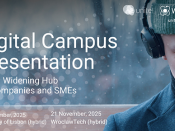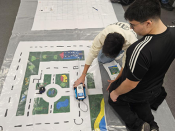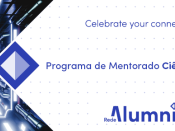Por Rui Pires da Silva Castro (Eindhoven University of Technology, The Netherlands).
Motivated by the problem of detecting a change in the evolution of a network, we consider the preferential attachment random graph model with a time-dependent attachment function. We frame this as a hypothesis testing problem where the null hypothesis is a preferential attachment model with n vertices and a constant affine attachment with parameter delta_0, and the alternative hypothesis is a preferential attachment model where the affine attachment parameter changes from delta_0 to delta_1 at an unknown changepoint time tau_n. For our analysis, we focus on a scenario where one only sees the final network realization (and not its evolution), and the changepoint occurs “late”, namely tau_n = n − cn^gamma with c<=0 and gamma in (0,1). This corresponds to the relevant scenario where we aim to detect the changepoint shortly after it has happened. We present two asymptotically powerful tests that are able to distinguish between the null and alternative hy pothesis when gamma>1/2. The first test requires knowledge of delta_0, while the second test is significantly more involved, and does not require the knowledge of delta_0 while still achieving the same performance guarantees. Furthermore, we determine the asymptotic distribution of the test statistics, which allows us to easily calibrate the tests in practice. Finally, we conjecture that in the setting considered there are no powerful tests when gamma<1/2. Our theoretical results are complemented with numerical evidence that illustrates the finite sample characteristics of the proposed procedures.
Joint work with Gianmarco Bet, Kay Bogerd, and Remco van der Hofstad.
Short bio: Rui Pires da Silva Castro is an Assistant Professor in the Department of Mathematics and Computer Science at the Mathematics Department at Eindhoven University of Technology, (TU/e). His research interests are on the borderline of signal processing, learning theory, and statistics, including learning theory, non-parametric and high-dimensional statistics, statistical signal and image processing, network inference, and pattern recognition. Rui is also interested in active learning techniques, also known as sequential experimental design. These include learning/sampling procedures that are able to use information gleaned from previous samples to adapt the sampling procedure. Applications include, among others, network monitoring and measurement and effective spectrum analysis methods for opportunistic transmission in cognitive radio. Previously, Rui worked on Distilled Sensing (DS), a multi-step, selective (adaptive) sampling procedure for recovering sparse signals from noisy observations. DS results in dramatic quantifiable improvements over the best non-adaptive sensing methods for the estimation and detection of sparse signals in noise.
Transmissão via Zoom.





















